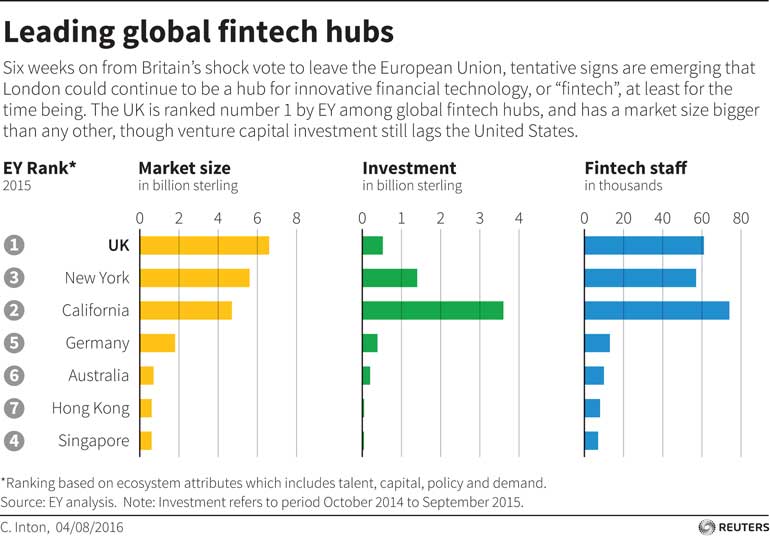Sunday Feb 22, 2026
Sunday Feb 22, 2026
Wednesday, 24 August 2016 00:01 - - {{hitsCtrl.values.hits}}

TOKYO (Reuters): Japanese financial firms risk falling behind on the world stage as efforts to adopt blockchain technology that promises to save billions of dollars in backroom processing and revolutionise the finance industry are hamstrung by a dearth of specialists.
Banks, brokerages and insurers in global financial centres are investing in the computer code that underlies the bitcoin virtual currency. They hope to draw on its ability to share vast amounts of sensitive data securely and in real-time, and eliminate stages of transactions like third-party verification.
But blockchain is so new that financial institutions are often forced to seek engineers and developers, not from the tech giants with which they have long collaborated, but among startup companies – the traditional incubators of embryonic technology.
In Japan, however, there are relatively few startups in a country that often ranks low for entrepreneurship. Consequently, blockchain talent is scarce, and finance houses risk being left behind as global peers pass blockchain savings on to clients.
“At the moment, there just aren’t any technicians in Japan,” said Chief Executive Hiroshi Shimo of Consensus Base, hired by Japan’s second-biggest brokerage by revenue, Daiwa Securities Group Inc, to develop a blockchain application.
“There was nobody who could do it inside the company or at the big IT firms,” said Shimo, the sole full-time employee in the company he set up last year.
Left behind
Consultancy Accenture reckons the efficiency of blockchain will cut annual costs in the financial industry by more than $ 20 billion by 2021. The technology, for instance, could simplify the interaction between buyers, brokers and clearing houses that currently make equities trades take up to three days to settle.
The prospect has prompted financial institutions since last year to develop, test and even implement the technology. Fuelling the trend are startups in so-called fintech hubs such as London, New York and Toronto that provide a steady stream of experts, said recruiters in Britain and Canada.
“There will be a paradigm shift in terms of banks’ cost structures,” said Chief Executive Takao Asayama of blockchain firm Tech Bureau Corp. “With blockchain, fees consumers are charged by foreign banks will get much lower.”
A shortage of talent, however, may delay Japanese finance houses in reaching the same level of competitiveness.
“It’s difficult to recruit blockchain engineers” in Japan, said Director Pascal Hideki Hamonic of fintech recruiter Descartes Search, LLC. “There just aren’t enough of them.”
Blockchain positions attract on average around two qualified candidates versus 10 for other software positions, Hamonic said.
Crucible crunch
The paucity of blockchain experts in particular is partly down to the stunted growth of fintech startups in Japan.
Well-funded startups are crucibles in which the technology is learnt, recruiters and blockchain companies said. But Japan has produced relatively few blockchain ventures, and those that have emerged have attracted less funding than global rivals.
The world’s third-largest economy is barren ground for entrepreneurs. Last year, Japan ranked 28th for access to finance and 61st for commercial and legal infrastructure; showed data from the Global Entrepreneurship Monitor.
In fintech, 167 startups are registered with Japan Venture Research, which tracks entrepreneurs in Japan. In the United States, venture capital database CB Insights counts 3,300.
Japan has around 20 blockchain-related startups, said Chief Executive Yasunori Sugii of fintech firm Currency Port, while the US has over 130. Those in Japan have raised $ 66 million over 10 deals since 2014, showed data from CB Insights, compared with the global total of $ 1.2 billion from 377 deals.
Rare partnership
One of those Japanese blockchain startups is Consensus Base, which with Daiwa Securities launched a three-month test in June of an application that processes trades on the Yangon Stock Exchange in Myanmar, part-owned by the brokerage.
Daiwa initially approached a number of big IT firms but a lack of blockchain expertise forced it to turn to startups, said Yoshiaki Ito of Daiwa Institute of Research, who is overseeing the test.
“Venture firms have the best understanding of the core technology,” Ito said. “We’ve been meeting them much more on the things some major (IT) vendors can’t do, like blockchain.”
It was an unusual step. Japanese finance houses tend to be reluctant to pair with startups because of strict compliance rules, said Asayama of Tech Bureau, further complicating their search for experts.
Other financial services providers such as Mizuho Financial Group Inc and Orix Corp have been able to explore blockchain with big-name IT firms such as Fujitsu Ltd and NTT Data Corp respectively.
Inevitably, the number of blockchain experts will rise and IT firms as well as finance houses will have their pick. To help increase supply, Japan’s Blockchain Collaborative Consortium launched a series of teaching seminars on Wednesday.
But the situation will not change overnight, said Chief Executive Yuzo Kano of bitcoin exchange bitFlyer, who has struggled to recruit blockchain experts. The technology is complex and relatively unknown, and producing a steady supply of skilled engineers will likely be a slow process, Kano said.
“It’s not as if blockchain can be learnt in a couple of months,” he said.